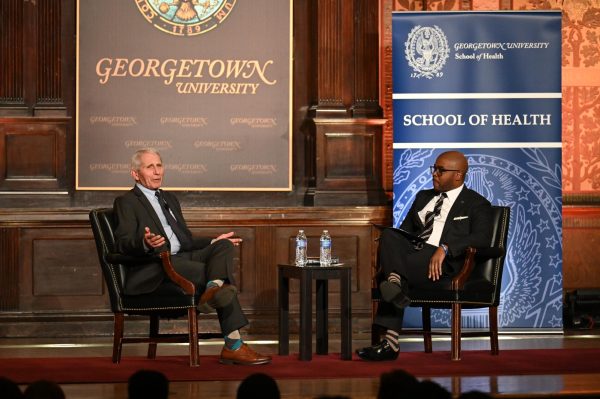Dr. Anthony Fauci encouraged students to pursue their passions and public service while reflecting on his career in public health during a talk at Georgetown University Jan. 15.
Fauci, who joined Georgetown as a distinguished professor in the School of Medicine in July 2023 and has a joint appointment in the McCourt School of Public Policy, attributed his success to his dedication to the general public and local communities while reflecting on personal stories about public service during the School of Health (SOH) event, titled “A Journey in Public Service.” Fauci drew on his decades-long career in public health to encourage Georgetown students to devote themselves to public service using stories chronicling his career in public health from his memoir “On Call: A Doctor’s Journey in Public Service,” published June 2024.
Fauci said leaders should focus on how to help others in their careers.
“The core of what this institution is about is service — service of others, of making the world a better place and not make it all about you, but what you can do,” Fauci said during the event. “So my feeling has always been that pick out something you can be passionate about.”
Fauci added that his personal focus on public service came from his father, a pharmacist whose work revolved around service.
“He just cared about the community, the neighborhood,” Fauci said. “The idea of public service was ingrained in me right away.”

Fauci started working in public health at the National Institute of Allergy and Infectious Diseases, which conducts clinical research into disease, where he was a lead researcher on AIDS treatment and diagnosis early into the epidemic. After his leadership during the outbreak of the COVID-19 pandemic, President Joe Biden appointed him as the Chief Medical Advisor to the President in 2021.
Fauci said his early work and research during the AIDS epidemic instilled in him a desire to help make an impact in both the medical field and the personal lives of those affected.
“I really wanted to take care of these people at the same time as studying the disease, and I also had this feeling of profound empathy for people who were already somewhat disenfranchised because of the stigma associated with LGBTQ people at the time,” Fauci said.
Fauci said his experience working with activists during the AIDS crisis reinforced his consideration of how social factors influence physical health while urging health care professionals to work toward changing perceptions of illnesses.
“When you look at HIV/AIDS, the access to care, the access to prevention modalities is much, much less,” Fauci said, “We’re in 2025 right now, so we have to keep pushing that as an agenda we can’t walk away from.”
Christopher J. King, dean of the SOH and the event moderator, said aspiring leaders should model themselves after Fauci’s emphasis on building relationships with LGBTQ+ activists during the AIDS epidemic.
“I think about leadership and now I think that surrounding ourselves with people and gifts and expertise that we don’t have is a hallmark of effective leadership,” King said during the event.
Fauci, who frequently sparred with President Donald Trump over health care policy choices, especially during the COVID-19 pandemic, said finding common ground across political differences is important.
“I had a very good relationship with President Trump, you know, he kind of respected what I was doing,” Fauci said. “I felt that I had responsibility for my own personal integrity, but more importantly to the American people who I served, that I had to do something which was profoundly uncomfortable for me, and that was to contradict the President of the United States publicly.”
Joie Hucko (GRD ’25), a student in the masters of health systems administration program who attended the event, said Fauci encouraged optimism in the face of difficulties in health care and politics.
“Dr. Fauci has such meaningful work that he’s done and his continued resilience throughout his career is very inspiring, especially as a future health care leader,” Hucko told The Hoya. “It kind of gives you hope in a state of the world that we’re currently in.”
Fauci said students should focus on issues they care about to build their careers on.
“You should have confidence at this point that you can do anything you set your mind to,” Fauci said. “If you figure out what you want to do, get passionate about it and work hard with it.”